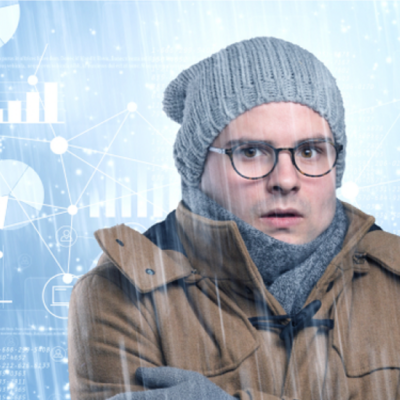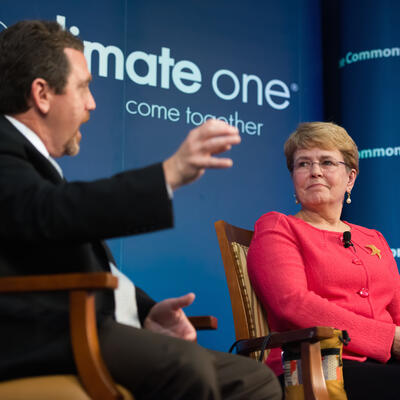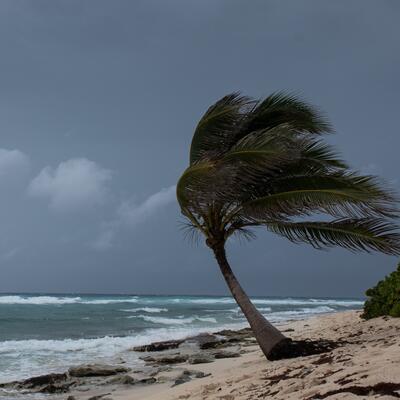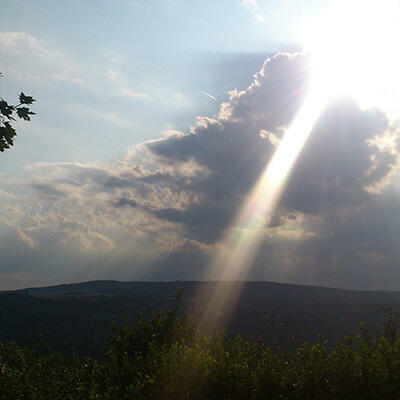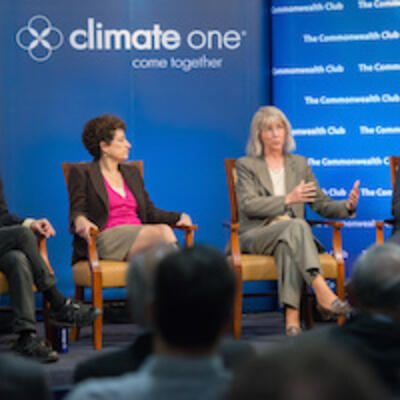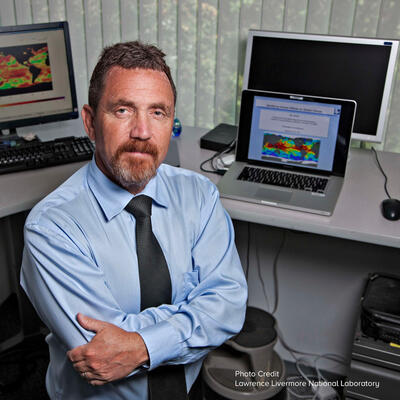
My Climate Story: Ben Santer
Guests
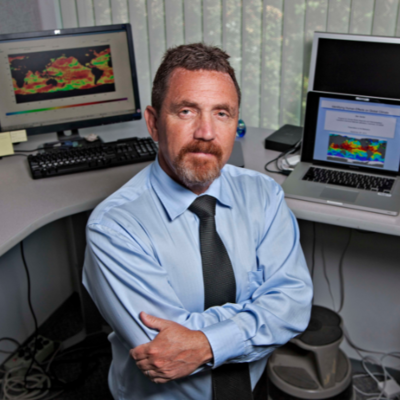
Ben Santer
Summary
This special episode is part of the My Climate Story series, published in partnership with Covering Climate Now, a global collaboration of more than 250 news outlets to strengthen coverage of the climate story.
In 1995, Ben Santer authored one of the most important sentences in the history of climate science: “the balance of evidence suggests a discernible human influence on global climate.” It was one of the first statements to identify humans’ role in driving climate change, and it was based on science. But the vitriol that followed was personal and malicious, impacting both Santer’s career and family.
“If you spend your entire career trying to advance understanding, you can't walk away from that understanding when someone criticizes it or criticizes you,” says Santer, now a scientist at Lawrence Livermore National Laboratory in Berkeley. With his research contingent upon government funding, Santer is concerned about the future of climate science under an administration that does not prioritize it.
Resources From This Episode (2)
Full Transcript
Greg Dalton: This is Climate One, changing the conversation about energy, the economy, and the environment. I’m Greg Dalton.
Behind the facts and figures that shape the climate narrative are scientists and others who pay a severe personal price for bringing that information to light.
Ben Santer: There was a dead rat on the doorstep. My son slept with his wooden sword after that. My marriage failed.
Greg Dalton: Ben Santer authored one of the most important sentences in the history of climate science. Written in 1995, it was one of the first to identify that humans were driving global heating. He’s now a scientist at Lawrence Livermore National Laboratory and concerned about the future funding of his work.
Today we’ll hear Ben’s story. It’s the first in a series as part of Covering Climate Now, a global collaboration of more than 250 news outlets to strengthen coverage of climate causes and solutions.
Greg Dalton: We begin in 1995 in a conference room in Madrid. Representatives from around the world are haggling over sentences and words to be included in the IPCC’s second summary of the state of climate science. Ben Santer is the convening lead author of a chapter that will change his life, and kick off a fierce offensive from the fossil fuel industry.
Ben Santer: In the plenary, in Madrid, much of the discussion focused on these 12 words, the balance of evidence suggests a discernible human influence on global climate, that was essentially the bottom line finding of our chapter. That when we looked at the available evidence back in 1995 most of it was pointing in one direction. Humans were active agents of change in the climate system no longer innocent bystanders. And that really was the first time that the international scientific community spoke with one voice and said, hey we see the scientific equivalent of the handwriting on the wall. What became clear at that meeting was a lot of powerful forces and countries did not like that finding.
Greg Dalton: What did countries try to do to stop this first indication of human fingerprints. This is seven years after Jim Hansen testified before Congress three years after the Rio Earth Summit. This is still very early in the climate story, the modern climate story. Who tried to stop this?
Ben Santer: Well, the meeting in Madrid lasted three days. And on the first day in plenary, the Kenyan representative said in plenary we do not need a detection and attribution chapter, there should be no Chapter 8. There is no scientific basis for anything that is said in this chapter, and all of this stuff was too preliminary and it should either be removed or down waited in the final version of the summary for policymakers, which was astonishing and shocking. We, dozens of scientists from around the world had just spent 1 1/2 years working on this chapter. So this statement take it out, take out Chapter 8 was shocking. And I pushed back strongly in plenary against that notion that there should be no Chapter 8. So that was the challenge that was evident in the first day. How do you defend the science in this highly charged political atmosphere where there are forces who not only seek to change or alter the science but also to remove it completely?
Greg Dalton: So the chapter gets approved the balance of evidence for the first time the international scientific community says humans are playing a role are contributing to the observed disruption of the climate. Then Fred Seitz attacks you in the Wall Street Journal. What happened?
Ben Santer: Well, Fred Seitz was a past president of the U.S. National Academy of Sciences. So had been the holder of arguably the most prestigious position in American science, not a climate scientist, not someone who had been involved with the IPCC, not someone who had been present in Madrid and yet he was writing in the Wall Street Journal in an opinion piece in the summer of 1996 that I, Ben Santer, was guilty of the worst abuses of the peer-reviewed system that he had seen in his 40 years as a scientist, and arguing that I'm guilty of serious professional misconduct.
Greg Dalton: And Fred Seitz also has some links with tobacco companies, right. So was he playing the tobacco playbook on you?
Ben Santer: Absolutely. And all those links with tobacco companies and being essentially a higher scientific gun for them came out in the book published by Naomi Oreskes and Erik Conway, Merchants of Doubt, that was a real shocker, an eye-opener for me because that book revealed that folks like Fred Seitz had been on the wrong side of the science, not just on the climate issue, but on the causes of ozone depletion and on pesticides and human health, cigarette smoking and cancer.
Tobacco company representative: We do not believe that cigarettes are hazardous, we don’t accept that.
Prosecutor: Have they been proved to be unsafe?
Tobacco company representative: I believe they have not been proved to be unsafe
Ben Santer: It was indeed a playbook, a pattern of behavior. If you don't like the science cast doubt on the scientists sow uncertainty everywhere you can and get paid handsomely for it.
Greg Dalton: Something called the Global Climate Coalition was formed around this time and they accused you of “scientific cleansing” a very charge term at that time when the war in the Balkans was going on with ethnic cleansing. So how did you feel and respond when you are accused of scientific cleansing?
Ben Santer: Awful. As you mentioned ethnic cleansing was going on in Bosnia thousands of people were being murdered, slaughtered because of their religion and/or their nationality.
Journalist: 8000 unarmed Bosnian Muslim men and boys were massacred by the Bosnian served military forces.
Ben Santer: So this term scientific cleansing was deliberate to evoke connotations of someone evilly altering the science for some nefarious purpose. The reality was that in the 1 1/2 years that I and other scientists had worked on Chapter 8 of the IPCC's assessment we had bent over backwards to address scientific uncertainty. It's our lifeblood uncertainty is part and parcel of all the science that you do and we fought hard to include in Chapter 8 uncertainty in computer models of the climate system and uncertainty in observations of climate change and uncertainty in the statistical methods that one applies to models and observations to draw inferences about the causes of change. So this incorrect and unjust claim that we had purged or cleansed Chapter 8 of all discussion of scientific uncertainty was A, absurd, B, deeply wounding and C, manifestly wrong. The problem was this is the pre-Internet era, and Cambridge University Press, the publishers of the IPCC report had distribution problems in the United States. So folks could write any old stuff they wanted to about Chapter 8 and it wasn't easy for folks to actually get a chapter, you couldn't go to website and download the chapter and see oh wow 20 percent of this chapter is explicitly devoted to the discussion of uncertainties, these claims are garbage. That was the challenge back then nearly 24 years ago now, that once these incorrect claims were out there these alternative facts, it was less easy to rebut them.
Greg Dalton: Fake news in the pre-Internet era --
Ben Santer: Has a long history.
Greg Dalton: Do you remember your first death threat? This incident, these 12 words that change your life put you in the international, in the crosshairs of fossil fuel industry some very dark forces resulted in death threats. Do you remember your first death threat?
Ben Santer: Well, one of the worst episodes was the dead rat on the doorstep episode. An article had been published about me and the work that I do in a local magazine. And shortly after that publication there was a knock on our door late at night about 10 o'clock I was upstairs with my son at the time. It took me about a minute to get downstairs and answer the front door. When I opened the front door there was a dead rat on the doorstep and a guy driving away at high speed down our street in a yellow Hummer shouting curses at me. That got to me because someone had gone beyond just writing threatening emails they had made the effort to figure out where I live and had done something.
Greg Dalton: What was the personal price of this? You stood up you said humans are causing this. How did it affect you and your family personally?
Ben Santer: I was living in an apartment with my son and every morning I checked under the car to make sure there was nothing there that shouldn't be there. My son didn't feel safe in our house. He slept with this wooden sword next to his bed after that; he felt threatened and I couldn't make that go away. I couldn't tell him, son, you don't need to be afraid. And all of that led to this deep-seated anger and frustration. This kind of intemperate language, scientific cleansing, abuses of peer review, has consequences in the real world. It affects lives. It affects one's sense of safety. It affects families. My marriage 24, 25 years ago failed and I certainly think that what was going on at the time, the intense focus on the balance of evidence finding, congressional investigations, calls for my dismissal with dishonor from my position at the Lab; all of those were contributory factors to what happened to me in my personal life. That since after the balance of evidence finding came out that nothing would ever be the same. My life would never be the same. I could never put the genie back in the bottle again. I could never go to an innocent and naïve world that I inhabited before 1995. It was like literally like loss of innocence recognition that there are these forces of unreason there in the world who seek to destroy to tear down who do not seek any kind of good-faith discussion about climate change and how to address this problem. They just want to win. And some fraction of the population believes them. They believe that you’re a criminal they write to you, they send you letters, they threaten harm to you and to your family. It was that unsettling understanding that people hated you some people hated you for what you did and for what you learned and for what you published. And they hated you enough to figure out where you lived and do something about it or they hated you enough to post your picture on a website, which is what stormfront.org did. And stormfront.org are a terrorist organization so that kind of thing gets your attention too. So it was this almost overnight growing up, maturing, loss of innocence.
Another thing that got my attention was when Jesse Ventura, the former governor of the state of Minnesota was involved with a TV program called Conspiracy Theory, this is truTV. And a film crew approach the public affairs office at Lawrence Livermore National Lab they misrepresented who they were, they didn't mention Jesse Ventura they didn't mention truTV. They said they wanted to make a documentary about Madrid about what had happened there and could they interview me. The Lab asked me whether that was okay I said yes. And this was bizarre - after the interview, they excised the interviewer who was actually asking the questions and put Jesse Ventura in. So it seemed like I was in the same room with Jesse Ventura and my answers were edited to make it appear as if I was indeed some criminal who had made changes to Chapter 8 in Madrid for some nefarious political intent. The German Nazi Party saw that interview with Jesse Ventura in truTV Conspiracy Theory and they posted stuff on their website about how I had admitted that I was trying to harm the world civilization. So actions in the real world have consequences. And no matter how hard you try to be a responsible scientist to do the best possible research you can to kick the tires, if the stuff you do matters to others, then you will encounter these forces of unreason as I did back in the late 1990s. And that's the concern today. We witness the same language being used hoax, conspiracy, incorrect dismissal of scientific understanding and that language has consequences in the real world.
Greg Dalton: Dana Rohrabacher, a Republican member of Congress questioned your funding at that time I don't think they looked into that.
Dana Rohrabacher: We don’t need to save the planet by utilizing certain energy. The CO2 focus is causing the great damage to the wellbeing of our people.
Greg: Funding for your project is currently up for renewal. Tell us about the prospects of that.
Ben Santer: Well, we are funded at Lawrence Livermore National Lab by the U.S. Department of Energy. And we have been funded for nearly 30 years now. As you know, the current administration does not, how should I put this diplomatically, does not seem interested in advancing scientific understanding of the reality and seriousness of climate change, and likely outcomes.
Greg Dalton: Lot of scientists are quitting USDA, people leaving EPA, a lot of scientists are quitting the federal government for various reasons.
Ben Santer: Unfortunately, my job is in the center of the maelstrom. We look at causation. We look at the nature and causes of climate change that research has shown human fingerprints on every aspect of the climate system, ocean temperatures, atmospheric temperatures, cloud cover changes the amount of moisture in the atmosphere, you name it, we and our colleagues around the world have looked at these things. This administration does not want to know about causes. It does not want to know about likely outcomes if we continue down a business as usual emissions pathway. I do not know what our prospects are for retaining funding over the next three years. I have no control of what the administration may or may not do. What I do have control over is how I choose to spend my time. I choose to spend my time working with my colleagues on stuff that really matters to people. Better understanding human contributions to changes in the properties of hurricanes, better quantifying the human fingerprints on climate. Looking for what people call transfer functions or immersion constraints things that we can measure in the climate system in today's world that might reduce uncertainties in projected future changes in sea level and temperature. So that's been a challenge to keep focused squarely on doing the best science we can even in these politically uncertain times.
Greg Dalton: And the hinge, the fate of your funding of you and about, what, 15 other scientists hinges on an anonymous panel and you're going to walk into a room with your fate in their hands and you can't know who the people are until you walk in the room. Is that right?
Ben Santer: Well, my best understanding is that the review process will be the same as it was last time. We don't know who the external reviewers will be. We hope they will be knowledgeable and we hope we will be reviewed on the scientific merits of the work that we propose to do. Whether this type of work, particularly in causation, in detecting and attributing climate change to human and natural factors. Whether that work will continue under this administration, and whether they see value in its continuation, who knows.
Greg Dalton: You also receive a lot of freedom of information act requests. And this sort of phoria [ph] harassment that happens to try to distract scientists from doing the real work and have buried you in paperwork and information request. Tell us about that and when do you, you and other climate scientists need to lawyer up?
Ben Santer: Well, those sorts of events are concerning and you're right, I have encountered them at numerous points in my scientific career. It does seem intentional, let’s throw our spanner in the works here. Let's slow these people down. Let's give them something to occupy themselves with other than science. The first request that I received was by a guy named Stephen McIntyre. And he in my opinion was not really intent on auditing us and on trying to reproduce what we had done. But he was more intent on whipping his followers up into a frenzy online.
Dana Rohrabacher: Just so you’ll know global warming is a total fraud, and it’s being designed because what you’ve got, they want to create global government to control all of our lives.
Ben Santer: And claiming that evil government-funded scientists weren't being forthright and weren't being transparent in terms of the simulation output from climate models that they were using. The irony and the frustration was that everything we do is freely available. The climate model outputs that we use in our research the satellite temperature data that we use in most of our research is available to anyone in the world. And if you truly want to audit someone and reproduce what they've done and check the findings that they've reached you can do that. That ability to access data climate scientists use is available to anyone in the world.
So it's very frustrating then to have to deal with these specious requests and waste time and energy and in the case I mentioned, then Mr. McIntyre got some of his folks whipped up that they wrote to the Department of Energy. And soon someone at the Department of Energy was writing to the director of Lawrence Livermore National Lab and asking why is Ben Santer not being compliant with freedom of information act requests. So these things have consequences again and it is indeed frustrating that you have to spend a significant amount of your time not doing what you love, science, not doing what you signed up for, science, but doing phorias [ph] and dealing with harassing email requests and explaining your actions when people accuse you of scientific cleansing. I guess the reality is that's now part of the job description of being a climate scientist in the 21st century.
Greg Dalton: What's the arc of the story. It's been almost 25 years since you wrote the 12 words said humans are causing climate change, very famous words in science.
Ben Santer: Well, the arc of the story is that the science has gotten stronger. Back then the balance of evidence suggests a discernible human influence on global climate was not eureka, there's water in the bathtub we understand everything, it was cautious. Lot of double negatives in there. Everything that's happened since then in terms of assessment reports of the intergovernmental panel on climate change has gone much further than that cautious balance of evidence statement. They've tried as we did not do to quantify the size of the human effect on climate and have concluded in the most recent report that most of the warming observed since the second half of the 20th century is extremely likely to be due to human caused fossil fuel burning. So we went from cautious balance of evidence suggests to its extremely likely that most of the warming since 1950 is on us. And that's been one arc of the story records are longer we’ve measured warming now over 24, 25 years longer than we did back in 1994, 1995. We have better computer models of the climate system we have more complete satellite measurements of every aspect of Earth's climate. We have better statistical methods to confront computer models with actual hard observations and make inferences about causation.
Many, many more scientists around the world have kicked the tires and tried to understand whether the balance of evidence finding was robust and they concluded yeah it is. You know, one of the criticisms, one of the justifiable criticisms back in ‘95 was you folks are mostly just looking at surface thermometer records. And you've shown yeah, there’s been some warming but if there really is a human caused climate change signal lurking in observations look in the depths of the ocean, look in atmospheric temperature, look in snow, look in sea ice, convince me and that's what happened. So part of the arc of the story is going from essentially temperature measurements to understanding that human fingerprints are visible in the entire climate system.
But part of the arc of the story is public understanding too. You know back then this stuff was controversial. Industry didn't like the finding, fossil fuel companies didn't like the finding, that humans were affecting global climate. Now there's been this seismic shift, this signal in public understanding and in the willingness of major companies, you know, think Exxon think Chevron think BP think Shell, to admit, yeah, humans are affecting the global climate and ultimately we have to address this problem. We have some responsibility to do so. The anachronism is the current administration. So at the local level at the state level at the corporate level at the international level everyone agrees human caused climate change is a reality and a serious problem. The challenge is convincing this administration to address the problem.
Greg Dalton: Ben Santer, thank you for sharing your story. And thank you for standing up for the truth.
Ben Santer: Thank you Greg for helping me to tell the story and for being a force for good in the world and a force for telling the stories of many scientists and many politicians and many business leaders who have stories to tell who want to make this world a better place. I'm just so grateful that an organization like Climate One exists to bring these stories out into the world. What happened back in 1995. What did we learn what was the process of putting together the balance of evidence finding what's happened since then. What are outcomes if we do nothing to address the problem. So there's been this deeper understanding of the role of the scientist in the modern world. That if you spend your entire career trying to advance understanding, you cant walk away from that understanding when someone criticizes it or, criticizes you. There's no point in being a scientist if you walk away from everything you devoted your life to.
Greg Dalton: Thank you.
Greg Dalton: To hear more Climate One conversations, subscribe to our podcast at climateone.org. Please help us get people talking about climate by giving us a review wherever you get your podcasts.
Greg Track: Kelli Pennington directs our audience engagement. Tyler Reed is our producer. Sara-Katherine Coxon is the strategy and content manager. The audio engineers are Mark Kirchner, Justin Norton, and Arnav Gupta, who also edited the program. Dr. Gloria Duffy is CEO of The Commonwealth Club of California, where our program originates. [pause] I’m Greg Dalton.
